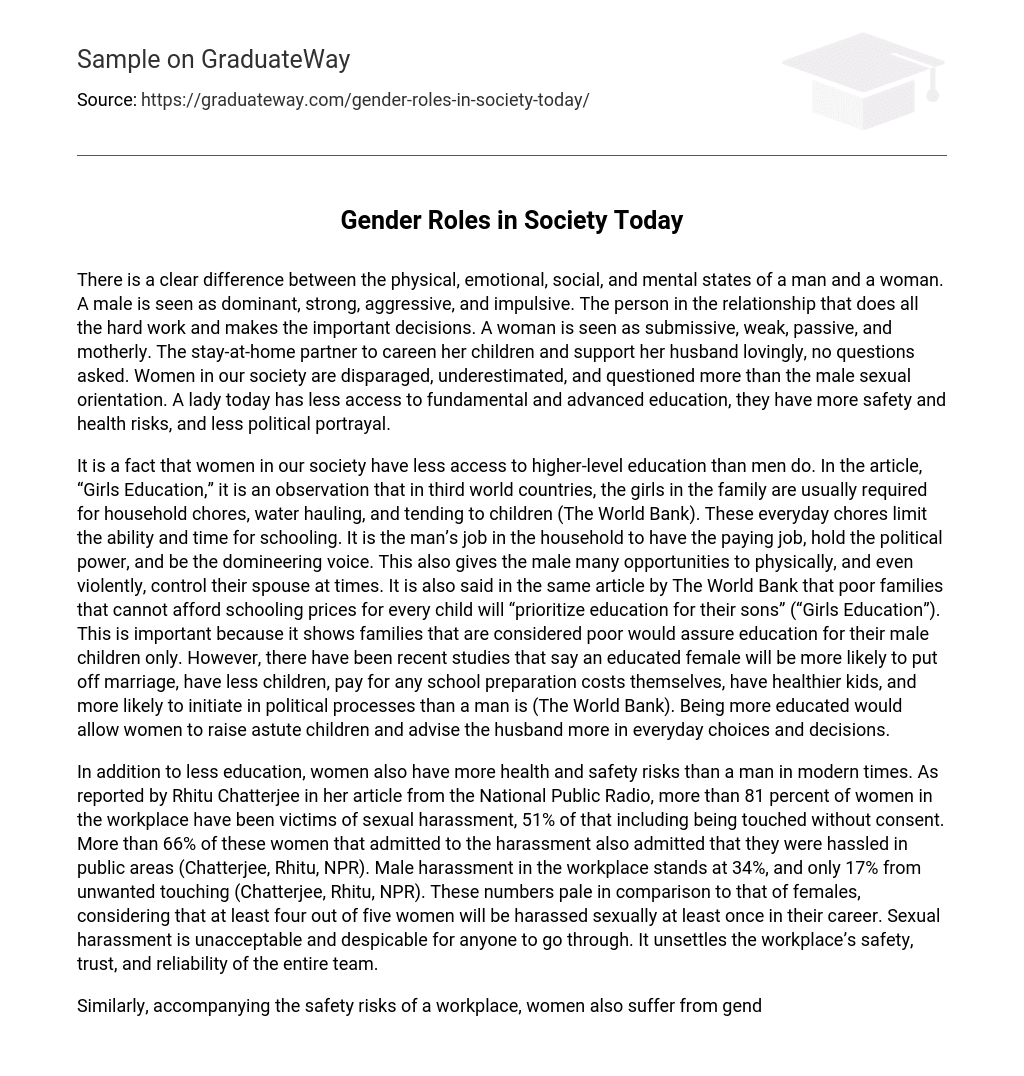There is a clear difference between the physical, emotional, social, and mental states of a man and a woman. A male is seen as dominant, strong, aggressive, and impulsive. The person in the relationship that does all the hard work and makes the important decisions. A woman is seen as submissive, weak, passive, and motherly. The stay-at-home partner to careen her children and support her husband lovingly, no questions asked. Women in our society are disparaged, underestimated, and questioned more than the male sexual orientation. A lady today has less access to fundamental and advanced education, they have more safety and health risks, and less political portrayal.
It is a fact that women in our society have less access to higher-level education than men do. In the article, “Girls Education,” it is an observation that in third world countries, the girls in the family are usually required for household chores, water hauling, and tending to children (The World Bank). These everyday chores limit the ability and time for schooling. It is the man’s job in the household to have the paying job, hold the political power, and be the domineering voice. This also gives the male many opportunities to physically, and even violently, control their spouse at times. It is also said in the same article by The World Bank that poor families that cannot afford schooling prices for every child will “prioritize education for their sons” (“Girls Education”). This is important because it shows families that are considered poor would assure education for their male children only. However, there have been recent studies that say an educated female will be more likely to put off marriage, have less children, pay for any school preparation costs themselves, have healthier kids, and more likely to initiate in political processes than a man is (The World Bank). Being more educated would allow women to raise astute children and advise the husband more in everyday choices and decisions.
In addition to less education, women also have more health and safety risks than a man in modern times. As reported by Rhitu Chatterjee in her article from the National Public Radio, more than 81 percent of women in the workplace have been victims of sexual harassment, 51% of that including being touched without consent. More than 66% of these women that admitted to the harassment also admitted that they were hassled in public areas (Chatterjee, Rhitu, NPR). Male harassment in the workplace stands at 34%, and only 17% from unwanted touching (Chatterjee, Rhitu, NPR). These numbers pale in comparison to that of females, considering that at least four out of five women will be harassed sexually at least once in their career. Sexual harassment is unacceptable and despicable for anyone to go through. It unsettles the workplace’s safety, trust, and reliability of the entire team.
Similarly, accompanying the safety risks of a workplace, women also suffer from gender bias when it comes to their health and medicinal equality. An article written by Vera Regitz-Zagrosek on the US National Library of Medicine National Institutes of Health, claims that “gender medicine must consider the needs of both sexes.” She points out that medicine cannot be a “one-size fits all practice”, but a gender-specific healthcare. This is essential because men and women are different in their physical and mental being. They will report symptoms differently, react differently, and must even be treated with drugs differently (Regitz-Zagrosek, Vera). Biological aspects in the female and male body include differences such as “reproductive function, concentrations of sexual hormones, the expression of genes on X and Y chromosomes and their effects and the higher percentage of body fat in women” (Regitz-Zagrosek, Vera). This will alter how certain parts of a gender-specific body will need to be taken care of and diagnosed as opposed to having one listed response.
Lastly, women are insufficiently represented when it comes to their ability to have political portrayal and power. Women are limited to their acceptance in executive positions, and even if they are allowed executive power, they stick women with civil discussions that stereotype women including “water, infrastructure, sanitation, roads, education and health” (“Political Empowerment.” Harvard University). Even though women have the right to partake in politics in ways a man does, such as voting and running for office, the actual number of women parliamentarians is only 21% worldwide (Harvard University). Women make up at least 51% of the population, and only own 1% of the world’s wealth (The World Bank). Thus, leaving men with 79%, 49%, and 99% respectively. Even if an education is attained, and a woman secures a high paying job, it will be “20% lower than men’s”, says the World Bank, in their article Girls Education. Meaning, that men are paid more in all careers, not in one specific area. If there were more female political representation, girls would be more likely to speak out against assault, participate in politics, and even involve themselves in education more rather than house work (Harvard University). There would be more cooperation from females in needed areas like politics. This could retain the support of half the country and unite everyone as a team instead of having a power struggle of men vs. women.





